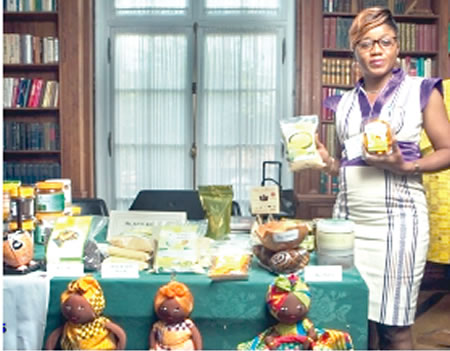The program “encourages women to think big and to share their dreams with others,” says Jennifer Galt, U.S. deputy assistant secretary of state for educational and cultural affairs.
Ambassadors from Africa were among those who attended a recent showcase in Washington of the women entrepreneurs’ wares, ranging from high-fashion clothing to textiles to cosmetics to food. Here are snapshots of several making a difference in the agricultural sector.
Looking to grow together
Zainab Mustapha Jaji hails from a family of entrepreneurs. Even at age 8, she says, she dreamed of starting her own business because she saw the difference her family was making in their community. Today she owns a cattle farm and runs an agricultural supply company and other enterprises that employ 70 people.
“We have come together as female entrepreneurs. Alone, it’s not going to work,” says Jaji, who is also a leader of the African Women’s Entrepreneurship Program network in West Africa.
Blending activism and business
Tanzanian entrepreneur Khadija Ally Said launched her natural honey business, Asali ya Bibi, on her mother’s birthday. She chose this special day because she wanted the world to notice — and appreciate — the role of women in economic development.
Khadija Ally Said buys her honey from a women’s group in Tanzania’s underdeveloped western corridor. (State Dept./D.A. Peterson)
“I want to empower them; I want them to feel that they have a sustainable market,” says Said. “I want them to feel worth, that they are doing something good.” With much-improved packaging, she is boosting sales and hoping to export Tanzanian honey to other countries, including the United States.
Bouncing back from failure
Originally trained as a civil engineer, Mariama Abdoulaye of Niger bounced back from failing at a coal mining business she started and found success producing artisanal jams and fortified flours. She also teaches other young women how to pave their own careers as she has done. “There’s high demand, and we are barely making enough to meet the local market needs. Our vision is to improve production,” she says.
“We need independent women, especially today, because women are the ones who support their families and give back to their communities,” says Abdoulaye.
It bothered Anick Natacha Kouadio of Cote d’Ivoire that 80 percent of locally grown mangoes rotted before they could be sold. She left a steady job and, with just $200, started a business that today employs 100. Her firm sells dried mangoes, rice and other staples grown by women farmers that no longer go to waste.
Anick Natacha Kouadio has three stores selling rice and other products grown by women. (State Dept./D.A. Peterson)
“These women already work in production, but they don’t do the processing. We wanted to work with them to add value to what they sell,” says Kouadio, who hopes to expand to 20 stores.
Forging their own path
Guinean entrepreneur Justine Lamah lost $15,000 — a colossal amount for her — when the first container of cooking oil she tried to export was returned for impurities. Through AWEP she has learned the quality standards for international shipping, has made sure her products are of the highest quality, and runs a business that is thriving.
Justine Lamah (left) of Welkema Exports of Guinea and Amina Azia Ouro-Agoro of Minagro Group in Togo display their wares. (State Dept./D.A. Peterson)
“I grew up with entrepreneurship in my family,” says Lamah. As a child, “I was going straight from school to the marketplace to help my parents sell their goods. … I was always looking to make money so I could be independent and support myself.”
Helping the next generation
Togolese entrepreneur Amina Azia Ouro-Agoro also was troubled by how much of the fruits of farmers’ labor went to waste.
By processing the food faster, she and her all-female workforce now make five tons of plantain powder per month and export flour to several countries. Her workers can pay their children’s school fees. “They are independent, autonomous, and they blossom,” she says.
WATCH TOP VIDEOS FROM NIGERIAN TRIBUNE TV
- Let’s Talk About SELF-AWARENESS
- Is Your Confidence Mistaken for Pride? Let’s talk about it
- Is Etiquette About Perfection…Or Just Not Being Rude?
- Top Psychologist Reveal 3 Signs You’re Struggling With Imposter Syndrome
- Do You Pick Up Work-Related Calls at Midnight or Never? Let’s Talk About Boundaries






